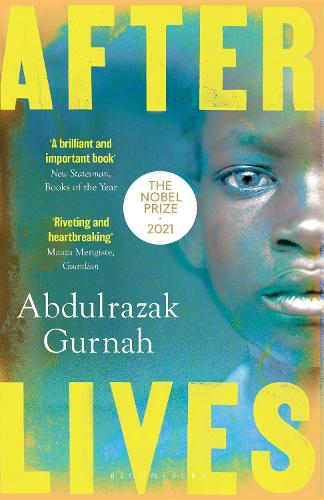Our book group choice for July 2022 is Afterlives by Abdulrazak Gurnah. While he was still a little boy, Ilyas was stolen from his parents by the German colonial troops.
Afterlives is a 2020 historical fiction novel by the Nobel Prize-winning Zanzibar-born British author Abdulrazak Gurnah. The novel is set in German East Africa (present-day Tanzania) at the turn of the 20th century, and it follows the lives of a group of people who are affected by the brutal colonization of their homeland.
The novel begins with the story of Ilyas, a young boy who is kidnapped by German colonial troops. Ilyas is taken to a mission school, where he is forced to learn German and convert to Christianity. After years of abuse and neglect, Ilyas eventually escapes from the mission school and returns home.
When Ilyas arrives home, he finds that his parents are dead and his sister, Afiya, has been sold into slavery. Ilyas rescues Afiya and takes her to live with him in the town of Tanga. There, they meet Khalifa, a Muslim merchant who takes them in and gives them work.
Afiya and Khalifa fall in love, but their relationship is complicated by the fact that they are from different cultures and religions. They also face the challenges of living under colonial rule. The German colonial government is oppressive and corrupt, and it often exploits the local people.
The novel also follows the story of Hamza, a young man who is forced to fight in the German army during World War I. Hamza is captured by the British and sent to a prisoner-of-war camp. After the war, Hamza returns home to Tanga, where he meets Afiya and Khalifa.
Afiya, Hamza, and Khalifa are all struggling to find their place in the world after the war. They have all been traumatized by their experiences, and they are all trying to rebuild their lives. The novel explores the themes of loss, trauma, love, and resilience.
Afterlives is a powerful and moving novel that sheds light on the devastating impact of colonialism. The novel is beautifully written, and it offers a nuanced and complex portrait of the human experience.
Here are some additional details about the novel:
- The novel is set in the coastal town of Tanga in German East Africa (present-day Tanzania).
- The novel spans the years from the late 19th century to the early 20th century.
- The novel explores the themes of loss, trauma, love, and resilience.
- The novel is written in a lyrical and evocative style.
- The novel has been praised by critics for its historical accuracy, its emotional depth, and its literary merit.
Discussion Questions for Afterlives
- Did you find the book an easy read? Was it difficult to get in to?
- The book starts with Khalifa’s backstory. Was all this background necessary for the story?
- What did you think of the narrative style? Rambling? Excess of background information? Or storyteller?
- Compare and contrast Ilyas’ and Hamza’s experiences of with the German occupiers
- How does the book portray the different colonial powers who try to control this part of Africa. Do their methods change over time/ between masters?
- What would you say was the main theme of the book?
- One theme of the book is exploitation. Other than colonial exploitation already discussed, can you think of examples of other types of exploitation?
- Another theme is loss. Do the losses bring people together?
- Education features strongly in the book. Whether formal or informal. What does literacy do for the characters in the book and do you think this was realistic?
- Give examples of the unexpected kindnesses shown in the book. Are these random acts?
- Despite the backdrop of colonial competition and upheaval, was this a happy book?
- Did religion make a difference to people’s life chances?
- Could any of the characters be said to be stereotypical?
- How did you view the unusual behaviour of young Ilyas? What did you think of the ‘treatment’ sought by the family and the outcome of this?
- Why do you think the author chose the title ‘Afterlives’?
- What did you think about the ending and Ilyas’ experience of life in Germany? What it a satisfying conclusion?
- Gurnah won the Nobel Prize for literature in 2021. On the basis of this book, does his writing merit the award? Does this book inspire you to read any of his other books?
Sue's Rating 




EmmaT's Rating 




Jo's Rating 




DKB's Rating 





